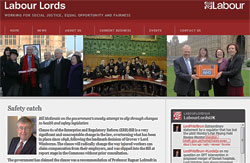 |
|
|
Workers Death And Injury Compensation Attacked In New Tory Bill
The Labour Lords website leads today (14th January) on a major article from Lord Bill McKenzie which goes into detail on the government’s dishonest and sneaky attempt to slip through major changes to health and safety legislation.
Lord Bill McKenzie of Luton is Labour’s Shadow Minister for Work & Pensions in the Lords.
As reported previously by Unionsafety, the Tory-led ConDem(ned) coalition is hell-bent on the destruction of workers health and safety protection. In April 2013 the HSE will be outlawed by Tory legislation from making any inspections in workplaces designated by the government as being ‘low risk’; unless and until a death or injury takes place first in such a workplace.
 Lord McKenzie’s web article focuses on the latest attack on Health And Safety legislation, made via Clause 61 within a new Tory Bill. Lord McKenzie’s web article focuses on the latest attack on Health And Safety legislation, made via Clause 61 within a new Tory Bill.
He explains:
Clause 61 of the Enterprise and Regulatory Reform (ERR) Bill is a very significant and unacceptable change in the law, overturning what has been in place since 1898, following the landmark decision of Groves v Lord Wimborne.
The clause will radically change the way injured workers can claim compensation from their employers, and was slipped into the Bill at report stage in the Commons without prior consultation.
The government has claimed the clause was a recommendation of Professor Ragnar Lofstedt in his independent consideration of health and safety legislation. Yet his report merely called for a review, stating: “I recommend that regulatory provisions that impose strict liability should be reviewed (by June 2013) and either quantified with ‘reasonably practicable’ or amended to prevent civil liability.
Lord McKenzie then comments on the current status of the duties imposed upon employers:
Regulations issued under the 1974 Health and Safety at Work Act contain the vast majority of duties that the law imposes on employers to create and maintain safe work places. A minority of these impose a strict liability on employers; others a less strict liability. With the latter, an employer will not be held in breach of a statutory duty if an accident could not have been foreseen or it was not reasonably practical to avoid. But if a breach of duty is established then an employee is entitled to claim compensation.
He then discusses the strict liability issue in the law:
Where strict liability applies the employer is liable for injury caused without proof of fault or failure. Strict liability applies, for example, to the Provision and use of Work Equipment regulations. It is justified because the employee does not have control over the selection, buying or maintaining of equipment, so the employer who provides it takes the risk if the equipment injures someone and is defective.
His article goes on to highlight the government aims in destroying the liability of employers for the health, safety and welfare of their employees:
Now, Ministers want to overturn this long established position, and all without proper consultation. In doing so, they are transferring the risk in “no fault” situations from employers (more accurately the providers of Employer Liability Insurance) to employees, their families and/or the state.
But Clause 61 does not just deal with strict liability.
 If enacted, it will remove all opportunities for an injured employee to seek compensation from an employer for breach of statutory duty. Employers will no longer be liable in the civil courts for the offence of a breach of Health and Safety at Work regulations; so the only remedy available to the injured employee would be to prove their employer was negligent. If enacted, it will remove all opportunities for an injured employee to seek compensation from an employer for breach of statutory duty. Employers will no longer be liable in the civil courts for the offence of a breach of Health and Safety at Work regulations; so the only remedy available to the injured employee would be to prove their employer was negligent.
Clause 61 will also mean that the route to justice and compensation where there is employer culpability is far less certain. Because an injured worker’s cause of action for breach of statutory duty is removed, the available remedy is to seek to prove negligence. The reality however, is that these are not equivalent avenues to justice and compensation. Indeed the government’s own impact assessment identifies that negligence is a more nebulous concept and therefore more difficult to prove.
The reality is that fewer negligence claims will be pursued, although those that are will be more costly and time consuming for all concerned. The bottom line is that fewer injured employees will receive compensation. They, their families and the state will pick up the consequences. Insurance companies will be the gainers. And justice will be denied.
Lord McKenzie’s explanation of the intent of Clause 61 concludes:
Let us bear in mind that compensation is not some prize or bonus for an employee. It is compensation for injury suffered. If Clause 61 is allowed to stand it will have profound and unacceptable consequences for thousands of employees injured at work. But there are broader ramifications for our health and safety system.
In short, it will be a signal to bad employers that they have a better chance of getting away with poor health and safety provision, reinforcing recent restrictions on the HSE’s budget and curtailment of proactive inspections.
Source: Labour Lords website
Go to Lords website by clicking the pic above
|
|
|
Designed, Hosted and Maintained by Union Safety Services
|